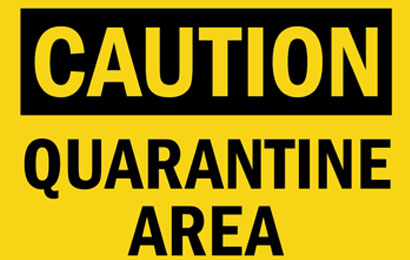Quarreling with Quarantine


As a survivor of Bulbar polio in my childhood, let me tell you what a real “civil rights” violation is.
Now I’ve heard everything! Quarantines are a violation of civil rights?
Here’s the civil rights violation: Not quarantining people who have deadly diseases. One of the few mandated obligations of our government is to protect its citizens. Exactly when and how did the sense of this get lost?
It seems every other day there’s a national argument breaking out because people no longer realize that the government’s main purpose is to keep us safe from threats both within and without the country.
When I was twelve years old I was diagnosed with Infantile Paralysis. Polio. This struck directly after my graduation from elementary school at the start of what was to be a grand slope of a summer, culminating in the glorious start of high school. I vividly recall that week, which began on such a high note and then unraveled into what we assumed was flu— crushing for such an eager little beaver who was about to step out to conquer the world.
The doctor who delivered me into the world came for a house call and decided it was, indeed, the flu. However, the next day, it alarmed my well-seasoned mother when the doctor called saying he wanted to come back and take another look.
I tiptoed out of my sickbed to spy while my mother whispered to my sisters, Sally and Katie: “This is frightening, girls! Never have I had a doctor call me to ask if he could come back to look at my child. Never!”
This turned out to be the last great summer epidemic of polio. It was the end of May. Dr. Salk came out with his vaccine the following November. But at that moment people were contracting the disease in droves and dropping like insects on a dog-day August afternoon.
When Dr. Flannigan returned the following day, it was only moments before he called an ambulance to whisk me off to the city’s public hospital in St. Paul, Minnesota.
Ancker Hospital was the only possible option when one was diagnosed with the dreaded polio. No private hospital would take you. So, in fear and trembling, I was torn from the sanctuary of my childhood bedroom amid sirens blaring and with my traumatized mommy gripping my hands as if it were to be our last moments together on earth.
They took us to an isolated room, attached but separate from the hospital. Tests were performed. One was a spinal tap, which taught me for all time the true meaning of God-awful pain. I learned then and there I could never withstand torture by Nazis or the Japanese as I’d always fervently believed. My first experience with profound all-engulfing pain taught me well that I would do anything to make such agony stop. Turn in my devoted mother. Beg them to do it to anyone else. Just make it stop.
After several tormenting hours we learned that not only did I have polio but that I had the most vicious form of all: Bulbar polio — the type that lands you in an iron lung. It had a 97% fatality rate.
Here is where my story has true relevance to current history: this was the fifties, the last period in our country when people behaved as adults, acting reasonably and seeing to it that they responded to such crises with care and maturity in order to protect each other.
I was instantly quarantined. My mother and sisters were quarantined in our home. I was placed in the Bulbar polio ward along with everyone else who had the exact same thing as I did. I was tearfully torn away while clinging to my bewildered mother as we both realized it might be the last time we would ever see, smell or touch each other in this lifetime.
I was installed in an open ward with about twelve beds occupied by people of both sexes, all ages. The only segregation was with respect to our particular strain of this killer, crippling disease. We were the Bulbar people. Those with spinal polio were elsewhere.
My mother and sisters were confined to our home, which they could not leave under any circumstances. An enormous yellow poster declaring that the premises were under quarantine was plastered over the front door of our innocent white house and no one could enter or leave for what I believe was thirty days. The groceries were ordered by phone and left on the steps down by the public sidewalk.
Health officials stormed my bedroom and every single thing was removed and burned. My dolls and teddy bears; my desk, bed and radio. Everything was taken from my little-girl room and destroyed.
Meanwhile I plotted like a wily cat to stay alive. Lying in that fevered and terrifying illness my mind raced as to how I could escape the drift of death, which was moving throughout that room. Every night some one or two of my fellow inmates died.
They always died at night, it seemed, and they had the exact same illness as I had. I was twelve years old and my lot was to quietly wait until it was my turn to be wheeled out as a corpse covered in a white sheet. After about a week this became highly notable and so I concocted a scheme to survive.
A patient with Bulbar succumbs under the tsunami of phlegm their body produces. As there were only two suction machines on the floor and half-staff at night, people were drowning in their own mucous.
I figured the only thing that might possibly get me out of that room and back at home would be if I stayed awake all night, every night. If I just piled high the pillows and sat up very straight maybe I wouldn’t suffocate in the never-abating ocean of snot.
Another thing which insured my alertness was the specter of the iron lung. There were only four of them in the hospital and they were strung up and down the sides of the hallways, as there wasn’t space in the rooms for such enormous contraptions. My two goals were to stay alive and then to elude that iron lung.
I stayed up all night every night doing crossword puzzles and reading, and then slept all day. Opening my dazed eyes from time to time I could contemplate the lung’s hideous form with some poor soul captured in its clutches just outside my doorway. Often there would be a heart-pounding stir as health workers suddenly burst into the room to perform an emergency tracheotomy with blood spurting everywhere and the pulsing of a life-and-death drama. This could happen at any time, during lunch or dinner; at midnight, upon whomever death had come to perch.
We were all perfect strangers locked in a sweaty struggle against death and atrophy, which oddly made us instant intimates. Even as a preadolescent what struck me most profoundly in those days and nights in that desperate room was the unceasing passion, heroism, self-sacrifice, and committed devotion of every person who labored to keep us alive.
I was such a desperate child longing for my family and home, convinced that I would never again see the people I loved. No one was allowed to visit; not even my mother. I was fortunate enough to have a window and in those days you could open them. I think we were on the eighth floor or so. My family would gather on the street corner below and as they waved up at me, I hung out of my window pleading, “Get me out of here!!”
Many, many people died in that room with me. Each time someone expired they were replaced by another Bulbar victim. One was a four-year old girl named Bernadette, whom I had befriended and taken under my older wing. The blow of her death stung deeply and I was gripped with shock for weeks.
Nurse Kaci Hickox, who recently returned from treating patients in Ebola-stricken Sierra Leone, is “fighting for her freedom”? She says “no” to quarantine? Doctor Craig Spencer, who contracted Ebola, lied about his movements after returning to the US? We find out he was out and about all over New York City? What kind of dedicated doctors and nurses are these people? They’re scientists, no? We deserve much better.
Nurse Hickox says quarantine is a violation of her civil rights. No, it is, in fact, your civic duty to accept quarantine. Have we really become such unspeakably self-involved, narcissistic, immature, mindless citizens? What a sad country we have dwindled to. How can it be that it isn’t commonly understood that quarantine is a vitally important, adult, necessary action in these scenarios? I can hardly contain my outrage at these persons’ indifference.
Back in the days of my childhood it never ever occurred to us to fight or resent or argue with the quarantine. For God’s sake, neither I at my callow age nor my family of various ages —nor anyone in that room with me— ever would have considered quarreling with the quarantine. On the contrary, I would have been horrified had I infected anyone else; nor did my mother and sisters bristle at their captive state.
They, we, waited it out, grateful to be surrounded by educated, thoughtful, concerned people who took care to confine us along with the disease. The plan worked and I got to walk out free and healed at the end of summer, just in time to attend the first day of high school.
These days I find myself consumed with a deep longing for that time in America when people actually grew into adults. We used to be quite wonderful people. Will we ever again be surrounded, nursed or even governed by caring grown-up fellow citizens?
The original article can be found at:
http://www.frontpagemag.com/fpm/244503/quarreling-quarantine-mallory-millett
Mallory Millett resides in New York City with her husband of over twenty years. CFO for several corporations, she is a long-standing Director of The David Horowitz Freedom Center and sits on the Board of Regents for the Center for Security Policy.

One thought on “Quarreling with Quarantine”
Keep up the great work, I read few blog posts on this web site and I conceive that your web blog is really interesting and has got sets of good info .